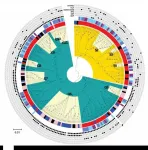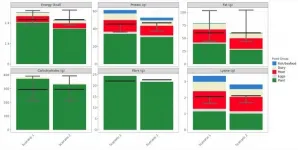Restoring gut microbes missing in early life dysbiosis can reduce risk of colitis in mice
A study in mice found that microbial imbalances induced by early exposure to antibiotics could be corrected by adding back a single strain of Bacteroides to improve the dysbiosis and prevent colitis
2021-06-07
(Press-News.org) A new study at the University of Chicago has determined that restoring a single microbial species -- Bacteroides sp. CL1-UC (Bc) -- to the gut microbiome at a key developmental timepoint can prevent antibiotic-induced colitis in a mouse model of the condition. The results, published on June 7 in END
ELSE PRESS RELEASES FROM THIS DATE:
New COVID-19 model reveals effectiveness of travel restrictions
2021-06-07
TROY, N.Y. -- More strategic and coordinated travel restrictions likely could have reduced the spread of COVID-19 in the early stages of the pandemic. That's according to new research published in Communications Physics. This finding stems from new modeling conducted by a multidisciplinary team of scientists and engineers at Rensselaer Polytechnic Institute.
The researchers evaluated the distance between countries in terms of air travel, a more complex measurement than simply mapping physical distance. For instance, while China and Thailand may be geographically more proximate to one another, if there are significantly ...
From meat-production to urinary tract infections
2021-06-07
In young women, Staphylococcus saprophyticus is a main cause of urinary tract infections (UTI), reaching 20% prevalence. Understanding the epidemiology of this microorganism can help identify its origin, distribution, causes, and risk factors. Now, ITQB NOVA researchers led by Maria Miragaia showed evidence that Staphylococcus saprophyticus can originate in food, namely in the meat-production chain.
Europe is the world's second-biggest producer of pork, the most favored meat type in these countries. One of the contaminants of that meat is S. saprophyticus, which is found also in the environment, ...
Two-thirds of women don't meet criteria to discontinue cervical cancer screening
2021-06-07
BOSTON - Current guidelines recommend stopping cervical cancer screening at age 65, but women over age 65 make up over one in five new cervical cancer diagnoses, and are twice as likely to die after a cervical cancer diagnosis compared to younger women. New research from Boston Medical Center found that fewer than one in three women aged 64 to 66 met the criteria to discontinue cervical cancer screening while looking at patients with both private insurance and from a safety-net hospital setting. Published in Gynecologic Oncology, researchers found that even among women with 10 years of continuous insurance coverage, ...
School lesson gone wrong leads to new, bigger megalodon size estimate
2021-06-07
GAINESVILLE, Fla. --- A more reliable way of estimating the size of megalodon shows the extinct shark may have been bigger than previously thought, measuring up to 65 feet, nearly the length of two school buses. Earlier studies had ball-parked the massive predator at about 50 to 60 feet long.
The revised estimate is the result of new equations based on the width of megalodon's teeth - and began with a high school lesson that went awry.
Victor Perez, then a doctoral student at the Florida Museum of Natural History, was guiding students through a math ...
Exploring an epidemic's meaning from the perspective of nursing
2021-06-07
PHILADELPHIA (June 7, 2021) - An article written almost 30 years ago helps frame social constructs around the COVID-19 pandemic. By reviewing the essay, an historian of nursing at the University of Pennsylvania School of Nursing (Penn Nursing) extends that construct to include nurses and patients, delivering a local and personal meaning to the epidemic experience.
In an essay in the Bulletin of the History of Medicine, Julie A. Fairman, PhD, RN, FAAN, Endowed Chair, the Nightingale Professor in Honor of Nursing Veterans, and Professor of Nursing at Penn Nursing, reviews Charles Rosenberg's 1992 article about the AIDS epidemic. Using Rosenberg's theme, she further develops the ...
Lead halide perovskites -- a horse of a different color
2021-06-07
Metal halide perovskites have been under intense investigation over the last decade due to the remarkable rise in their performance in optoelectronic devices such as solar cells or light-emitting diodes. Despite tremendous progress in this field, many fundamental aspects of the photophysics of perovskite materials remain unknown, such as a detailed understanding of their defect physics and charge recombination mechanisms. These are typically studied by measuring the photoluminescence - i.e. the emission of light upon photoexcitation - of the material in both the steady-state and transient regimes. ...
The latest science on staying healthy during pregnancy
2021-06-07
Rockville, Md. (June 7, 2021) - Healthy habits are particularly important during pregnancy. Four new studies being presented at NUTRITION 2021 LIVE ONLINE look at how supplements, eating habits and physical activity can affect various aspects of health during pregnancy.
Prenatal supplements might influence bacterial composition of breast milk
Breast milk contains a unique mix of bacteria - known as its microbiota - that plays an important role in child health. In a new study, researchers from Purdue University examined whether diet or supplements taken prenatally affected the microbiota of breast milk in 771 mothers participating in the CHILD Cohort Study. The analysis revealed that supplements, but not dietary patterns, were linked with changes in human milk microbiota ...
Most Americans are not getting enough fiber in our diets
2021-06-07
Rockville, Maryland (June 7, 2021) -- Only 5% of men and 9% of women are getting the recommended daily amount of dietary fiber, according to a study being presented at NUTRITION 2021 LIVE ONLINE. Insufficient fiber intake is associated with a higher risk of heart disease and diabetes, two of the most common diseases in the U.S.
"These findings should remind people to choose fiber-rich foods like whole grains, fruits and vegetables to reduce their risk for heart disease," said Derek Miketinas, PhD, RD, an assistant professor at Texas Woman's University, the study's ...
Cutting food waste alone won't solve world's nutritional needs
2021-06-07
Rockville, Maryland (June 7, 2021) -- Reducing food waste is crucial to our ability to feed the growing human population but will not fully solve the problem alone, according to a new study based on a computational model.
Researchers calculate that the world already produces enough protein and energy to feed 9.7 billion people--the projected population as of 2050--if food waste were cut in half. However, projections indicate global food production will still fall short in terms of micronutrients that our bodies need to stay healthy, including calcium, iron, vitamin E and others.
"Reducing food waste would give us enough protein and food energy to feed the 2050 population today--but not enough of the essential ...
Trying not to overeat? How you eat matters
2021-06-07
Rockville, Maryland (June 7, 2021) -- According to a new study, people who eat faster or take larger bites are more likely to eat more at a meal. The research, which is being presented at NUTRITION 2021 LIVE ONLINE, provides new insight into the factors that might contribute to overeating.
The study also adds more evidence that people eat more when given larger portions. The researchers found that study participants ate, on average, 43% more when the portion size of a meal was increased by 75%.
"Although studies have consistently found that people eat more when they are served larger portions, less is known about why this happens or why some people ...
LAST 30 PRESS RELEASES:
National poll finds gaps in community preparedness for teen cardiac emergencies
One strategy to block both drug-resistant bacteria and influenza: new broad-spectrum infection prevention approach validated
Survey: 3 in 4 skip physical therapy homework, stunting progress
College students who spend hours on social media are more likely to be lonely – national US study
Evidence behind intermittent fasting for weight loss fails to match hype
How AI tools like DeepSeek are transforming emotional and mental health care of Chinese youth
Study finds link between sugary drinks and anxiety in young people
Scientists show how to predict world’s deadly scorpion hotspots
ASU researchers to lead AAAS panel on water insecurity in the United States
ASU professor Anne Stone to present at AAAS Conference in Phoenix on ancient origins of modern disease
Proposals for exploring viruses and skin as the next experimental quantum frontiers share US$30,000 science award
ASU researchers showcase scalable tech solutions for older adults living alone with cognitive decline at AAAS 2026
Scientists identify smooth regional trends in fruit fly survival strategies
Antipathy toward snakes? Your parents likely talked you into that at an early age
Sylvester Cancer Tip Sheet for Feb. 2026
Online exposure to medical misinformation concentrated among older adults
Telehealth improves access to genetic services for adult survivors of childhood cancers
Outdated mortality benchmarks risk missing early signs of famine and delay recognizing mass starvation
Newly discovered bacterium converts carbon dioxide into chemicals using electricity
Flipping and reversing mini-proteins could improve disease treatment
Scientists reveal major hidden source of atmospheric nitrogen pollution in fragile lake basin
Biochar emerges as a powerful tool for soil carbon neutrality and climate mitigation
Tiny cell messengers show big promise for safer protein and gene delivery
AMS releases statement regarding the decision to rescind EPA’s 2009 Endangerment Finding
Parents’ alcohol and drug use influences their children’s consumption, research shows
Modular assembly of chiral nitrogen-bridged rings achieved by palladium-catalyzed diastereoselective and enantioselective cascade cyclization reactions
Promoting civic engagement
AMS Science Preview: Hurricane slowdown, school snow days
Deforestation in the Amazon raises the surface temperature by 3 °C during the dry season
Model more accurately maps the impact of frost on corn crops
[Press-News.org] Restoring gut microbes missing in early life dysbiosis can reduce risk of colitis in miceA study in mice found that microbial imbalances induced by early exposure to antibiotics could be corrected by adding back a single strain of Bacteroides to improve the dysbiosis and prevent colitis







